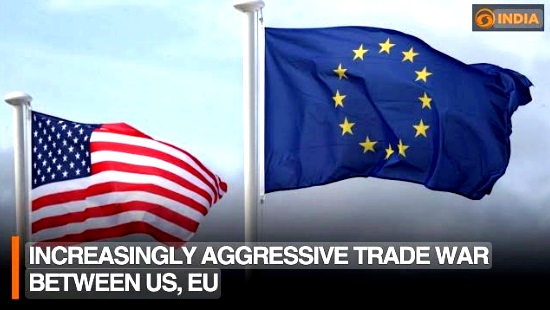
European equipment manufacturers want changes to the July trade deal after being hit by the White House’s expanding steel tariffs, ‘The Wall Street Journal’ writes.
When President Trump unveiled his trade deal with the European Union in July, businesses across the bloc thought it would end months of uncertainty for one of the world’s most lucrative trade relationships.
Less than two months on, frustration with the deal is growing in Europe. Businesses are halting exports to the U.S., complaining about new bureaucratic hurdles and warning about a new era of unpredictability.
The reason: the Trump administration’s decision to expand its 50% metals tariffs to cover hundreds of additional products that contain steel and aluminum, slapping a large number of European manufacturers with tariffs higher than the 15% Trump and the EU agreed on for most products.
While the U.S. steel and aluminum tariffs initially targeted only the metals themselves and mostly metal parts, such as screws, they now apply to such objects as motors, pumps, machine tools and construction equipment.
“About 30% of U.S. machinery imports from the EU are now subject to 50% tariffs on the metal content of the product,” Bertram Kawlath, president of the German Mechanical Engineering Industry Association, or VDMA, wrote in a letter to European Commission President Ursula von der Leyen at the end of August. The sector, he added, is facing an “existential crisis.”
The grudging acceptance that greeted the July deal is now threatening to unravel. Discontent is spreading not just among politicians within EU member states but also to the European Parliament, whose approval is required for key parts of the deal to take effect.
“There is no security and predictability” in the U.S.-EU deal, said Bernd Lange, a German politician who leads the parliament’s trade committee. Lange said he now expects lawmakers to demand changes to draft legislation that would eliminate or reduce tariffs for a range of U.S. imports under the July agreement.
Bernard Krone, head of Krone Group, which makes farming equipment and commercial vehicles, agrees.
After the Department of Commerce expanded the metals tariffs to hundreds of derivative products starting last month, the company stopped exports to the U.S., halted production destined for the market and sent 100 workers home. Krone is looking into diverting shipments already under way to Mexico and Canada.
“We don’t know if our customers are ready to pay 15% or 50% more for a machine or its spare parts,” said Krone, adding that the disruption would affect the company’s U.S. sales for a long time.
EU trade chief Maroš Šefčovič said Wednesday that the EU doesn’t pose a threat to American steel producers, and both economies are dealing with cheap imports from other countries.
“I know that they understand the issue, they know about our positions, but when we will be able to resolve it I wouldn’t dare to say,” Šefčovič said.
European officials said after the trade deal was announced that the two sides would work on a quota system that could allow a certain volume of EU steel and aluminum into the U.S. at a lower tariff rate. But they haven’t disclosed any progress on those talks.
The VDMA says such quotas wouldn’t address the main complaint about the expanded steel tariffs: the bureaucratic burden they impose on manufacturers. If their products are on the steel tariff list, they need to research their metal content or risk penalties.
Krone is planning to build its first assembly line near its U.S. headquarters in Olive Branch, Miss., but only for small machines. A dearth of skilled labor and high production costs make it harder to manufacture bigger, more complex equipment there, according to the company.
Andrew Adair, trade adviser for America at the VDMA, said American manufacturers in the U.S. could be among the first to suffer because they rely on imported machines that will now be more expensive, if they are available at all.
Vice President JD Vance held a speech at a plastics factory in Michigan in March, saying the Trump administration would “make it easier and more affordable to make things again in the United States.”
read more in our Telegram-channel https://t.me/The_International_Affairs

 11:54 09.09.2025 •
11:54 09.09.2025 •






















